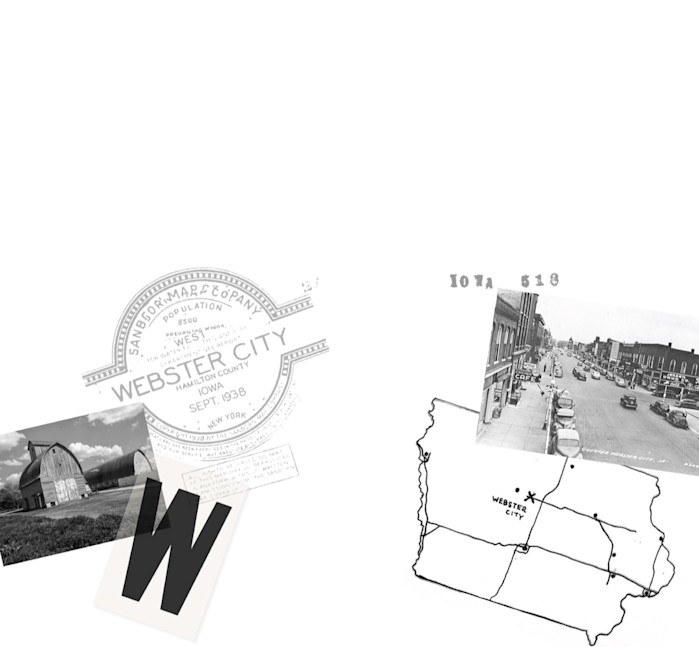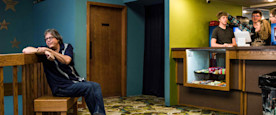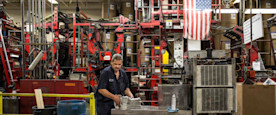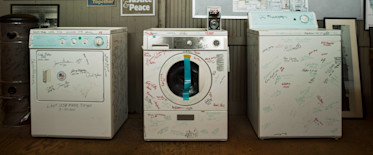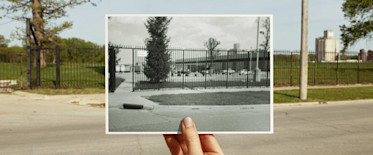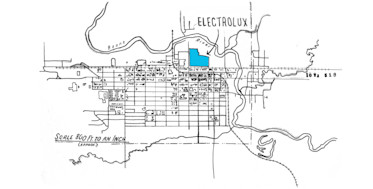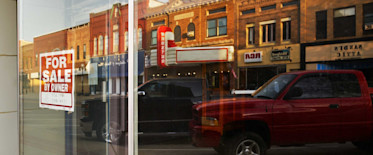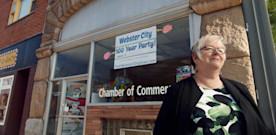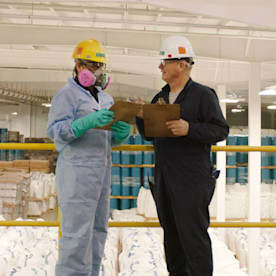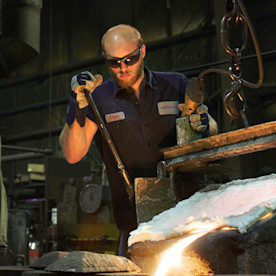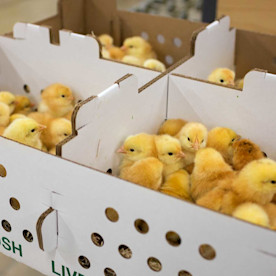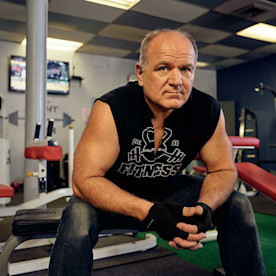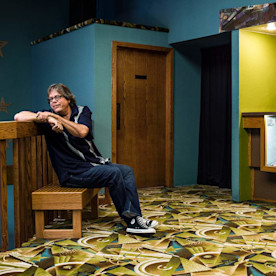MADE IN IOWA
In March 2013, Webster City’s quaint, historic Second Street had fourteen empty buildings.
Deb Brown counted them. She was interviewing for Webster City, Iowa’s Chamber of Commerce director, and as Chamber director, she would be responsible for helping to fill them. Her battle to make Second Street bustle again would be an uphill one: The town’s largest employer had left and there was little foreseeable investment in downtown—or interest in new small business in general.
Second Street, Webster City
Webster City, the seat of Hamilton County, is an hour and half drive straight north of Des Moines, just outside the very southeastern reaches of the Rust Belt. For 74 years, Webster City was a factory town. At its peak, the Electrolux plant at the end of Des Moines Street employed 2,300 people. Webster City has a population just under 8,000. While not all the Electrolux employees lived in Webster City, it’s fair to say everyone who worked at Electrolux spent their money on Second Street . On October 23, 2009, Electrolux announced that would be stopping. It would be moving all operations to Juarez, Mexico, and waves of layoffs would begin within weeks.
While Webster City could have become another poster child for American manufacturing’s flight abroad—a sort of Detroit-in-Iowa—it diversified its economy, pumped new life into its historic downtown, and emphasized the development of locally-owned businesses. Webster City saved itself.
A job at Electrolux was referred to as “the best job within 40 miles.”
Employees were paid up to $23 an hour with defined pensions, 401k plans, and excellent health insurance. Fathers and sons and brothers and sisters worked side by side for their entire careers.
“You left high school, you went across the street and you worked at the factory. It’s what you did.”
LOW UNEMPLOYMENT
Hamilton County, Average 2001-2008
HIGH HOURLY WAGES
Electrolux paid well
“All our eggs were in one basket,” says Kay Ross, owner of Seneca Street Saloon. Ross even structured her saloon’s hours around Electrolux’s shifts—one happy hour ran when the early shift got out, the other when the late one did. After the last-ever shift finished, Ross’ saloon was really, truly busy for the last time in a while.
On March 31, 2011, the last set of washers and dryers rolled off the line at the Electrolux plant in Webster City.
The last three machines off the Electrolux line, signed by the employees who made them.
The plant’s shutdown, on the back of the national recession of 2009, skyrocketed Hamilton County’s unemployment to 10 percent by 2011—a high figure for a town that takes a lot of pride in its Midwestern work ethic.
All of Webster City began to feel the slow disappearance of the plant’s jobs and the disposable income that came with them. Second Street saw businesses struggle and close. Jobs that had been created in service of Electrolux, like parts manufacturing, warehousing, and distribution, downsized or disappeared altogether.
Employment in Hamilton County decreased as soon as Electrolux layoffs began.
The now-vacant Electrolux site.
While other small cities in Iowa share similar stories of manufacturing-related devastation, recovery has been less consistent. Some, like Iowa City, Monona, and Edgewood, are still reeling from major layoffs at auto components plants. Others looked at new industries for hope. Newton, Iowa, was able to replace its shuttered Maytag plant with wind turbine manufacturing.
Webster City chose a different path to recovery: diversification and entrepreneurship. Today, unemployment is down to three percent. (“And that’s just the people who don’t want to work,” says Ross with a smile.) This fall, development of 53 new home lots will be completed. There’s a waitlist for buyers. It’s an almost inconceivable—and unusual—bounceback in such a short amount of time.
“I think it’s fair to say that pretty much every business and every person in town was touched by the closing of the plant.”
Four days after Deb Brown started at the Chamber of Commerce, the historic Webster Theater closed.
The theater, which had been showing movies on Second Street since 1934, had been struggling for years under poor, out-of-town management. It was a significant blow for the town—and also just another empty building.
So Brown conceived of an Empty Buildings tour. “I thought, instead of hiding the buildings, let’s look at them. Let’s talk about them. Let’s do a tour of them.” Her Empty Buildings tours were hosted by “Chamber Champions,” older, retired business owners who told stories of what had been there before, and what could be there now.
The tours drew a surprising amount of attention—they have since been imitated by other towns in Iowa—and soon prospective tenants were joining.
Deb Brown at Webster City Chamber of Commerce.
Karla Wetzler has been the planning director of Webster City since 1985.
She began preparing her city for Electrolux’s departure years before the official announcement. After conversations with ex-employees, Wetzler and her team focused on education and entrepreneurship to restart their local economy. Entrepreneurship, in particular, isn’t an unfamiliar concept to Webster City’s citizens: they can claim a local, self-made billionaire.
Bob Van Diest began selling fertilizer to farmers in the 1950s. Today, his herbicide plant manufactures for Monsanto and Dupont. He was once listed amongst Forbes’ Billionaires, although, in a show of typical Iowan humility, he asked to have his name removed from the list. Van Diest Supply has expanded since Electrolux’s departure and now employs around 700 people, many of whom used to work at Electrolux.
Karla Wetzler
“We found out that what these Electrolux employees were really interested in was in getting educated and changing careers or starting their own businesses.”
But Van Diest isn’t doing it alone: the hundreds of middle-class jobs left behind by Electrolux are being filled by industrial-type businesses like Vantec, Seneca Foundry, and others who have either started or expanded since Electrolux left. Vantec produces thermoplastic molded components, and Electrolux was their big customer. When Electrolux started layoffs in 2009, Vantec went from 225 employees to 80. Today, they total over 200 employees again and have opened another location in Falls City, Nebraska.
And Webster City, by virtue of being in Iowa, has an advantage that similar-size towns in, say, Michigan do not: agriculture. Murray McMurray Hatchery started here in 1917 and now claims to be the world’s largest rare breed hatchery. Mary Ann’s Specialty Foods is expanding. A pork-processing plant is opening. VeroBlue, a fish farm that’s predicted to someday be the largest in North America, has opened across the street from the Electrolux grounds, and there is talk of the multiplier effect again. One key difference between these businesses and Electrolux: These are locally owned and operated.
After her Empty Buildings tour, Brown hit on her next idea: an incubator program.
She wanted to convert tour participants into business owners. So she convinced building owners to offer prospective entrepreneurs three months of free rent followed by reduced rent for the rest of the year. Business owners would be responsible only for utilities, and the Chamber of Commerce would help them draw up a business plan and promote them once open.
Denise Smith was one of those whom Brown successfully recruited. Brown met Smith selling antiques at a fair outside of Webster City. “They were actively seeking businesses out, and they were willing to break the mold. That optimism is what drew us in,” says Smith. She opened SOS Vintage on Second Street in 2013 and hasn’t looked back.
Donovan Cusey had been laid off at Kenco, which warehoused for Electrolux. Brown convinced him, too, that Second Street had room for his dreams, and he opened Second Street Fitness through Brown’s incubator program. And, perhaps most significantly, a group began work on reopening the Webster Theater.
Jeff Pingel, a former Electrolux employee and self-described movie lover, decided he just couldn’t live in a town without a movie theater. With Deb Brown’s assistance, Pingel, Kay Ross, and Jerry Kloberdanz, a former Electrolux union leader, started a nonprofit and began a campaign to save the Webster Theater.
Within 16 months, they had raised over $250,000—at a time the town was struggling—and completely renovated the theater. Hundreds attended the marquee lighting on September 8, 2014, and many describe the reopening of the theater as a key turning point for Webster City itself.
The entrepreneurial spirit in Webster City is more than a curiosity, it’s an engine—and it’s driving the city’s recovery. Unemployment after Electrolux left: 10 percent. Unemployment today: 3 percent. Number of large multinational businesses brought in since Electrolux’s departure: 0.
Challenges remain. Now, with high school graduates unable to walk into a factory job, more students are pursuing two- and four-year degrees in larger towns and cities like Ames, Iowa City, and Des Moines. They often stay away for a while, and bringing them back to Webster City while they’re in their twenties or thirties isn’t easy.
Still, the residents of Webster City are proud of how far they’ve brought their town. Whether a reinvention or a return to roots, the turn to entrepreneurship has brought the town together and back to life. It seems the way forward, and not just for Webster City, either.
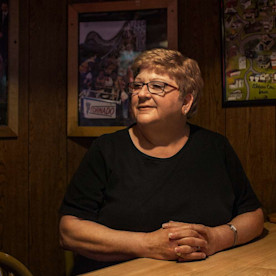
“I'm very, very hesitant about a large factory coming to town again. We got burned that way once. I'd much rather see many small businesses here so that we are not so dependent on one major employer.”
Kay Ross, Seneca Street Saloon
A 2015 study by the U.S. Environmental Protection Agency found that towns roughly the size of Webster City recovered from the 2009 Great Recession at a faster rate when they invested in their historic downtowns and diversified local business development. Similar recoveries happened in Dubuque, Iowa, and Douglas, Georgia, which also saw large-scale manufacturers leave the area. In fact, Hamilton County’s positive job growth following the recession is actually an anomaly, as counties with fewer than 100,000 residents lost about 1 percent of all jobs in the U.S., and rebounded from the recession more slowly than larger counties across the country.
Of the 12 buildings Deb Brown highlighted on her first Empty Buildings tour in 2013, 10 are now occupied. As for Brown herself, she’s moved on from the Chamber of Commerce to start her own business, SaveYour.Town, a consultancy dedicated to, yes, helping small towns save themselves. Webster City’s new Chamber Director, Linda Christianson, stresses her work will largely be about continuity. First on her list: a big anniversary celebration for the Webster City Chamber of Commerce itself—which has now been nurturing Webster City’s special, local entrepreneurial spirit for exactly 100 years.
Employment in Hamilton County is back on the rise.
Meet the businesses of Webster City
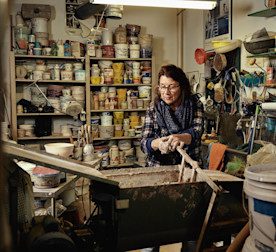
The Produce Station Pottery
Maureen Seamonds
“When a community has to reinvent itself, we have to ask ourselves serious questions about what we want to become. It’s a reinvention, but I also think it’s a return to our roots.”

La Campana Tienda Latina
Jose, Michael, and Jonathan Mendez
“People from other cultures miss their traditional dishes, so there is a need for a store like this in Webster City—we help people find the products they can’t find anywhere else.”
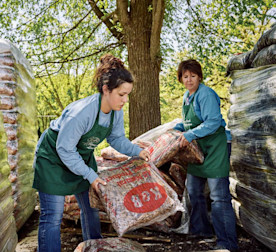
Stony Creek Landscapes
Tim and Sherry Adams
“Our community will be better off with small individuals creating our own little economy as opposed to one big company that everybody has to depend on for a paycheck.”
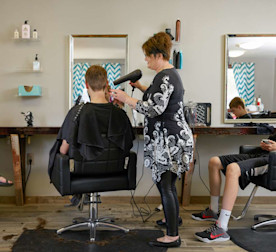
pHairytale Salon
Tina Poland
“I want my town to be successful, because I can’t be successful if my town is not. So I get to know the people in the town, whether they’re sitting in my chair or not.”

The Dance Connection
Becky Harfst
“Webster City embraced me as a person and as a business, and that’s why I’m here. I love the people, I love the kids, I love the relationships.”
Donate to the Webster Theater
We’ve set up a special $Cashtag so you can help keep the nonprofit Webster Theater going.
